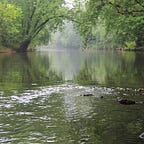Cedar River Watershed farmers doing good conservation
Mower, Dodge and Freeborn SWCDs’ 2023 ‘Outstanding Conservationists’ all within watershed
Three farm families in Minnesota’s Cedar River Watershed have been honored for their conservation-minded operations to prevent erosion and improve water quality.
As part of the statewide Outstanding Conservationists of the Year program, the Soil & Water Conservation District (SWCD) offices in Mower, Dodge and Freeborn each honored a local farm family for being good stewards of the land, and they all farm in the Cedar River watershed.
Each family was recognized in December 2023 at Minnesota Association of Soil & Water Conservation Districts’ (MASWCD) annual conference.
Mower County
Mower SWCD honored Gary and Michelle Angell, who live in central Mower County near Elkton, for partnering on soil-health research and projects to build a dozen water-and-sediment control basins and a dozen grassed waterways. Those projects reduce soil erosion from rainstorms and snowmelt.
Since the 1980s, the Angells also have used ridge-till — a practice for minimal soil disturbance — to cut production costs while maintaining yields and soil health.
Started in 1958 by Gary’s father Donald Angell, the Angell farm today operates 1,500 acres, raising corn, soybeans and hogs. Every other year in the fall, the Angells build ridges and deep bands nutrient applications into their cropland. With ridge till, they have seen improvements to the soil structure, less compaction, increased soil organic matter and higher counts of earthworms.
Angells also use variable-rate fertilizer and split application for their nutrient program to minimize nutrient loss and increase productivity.
Freeborn County
Farming in the headwaters area of Turtle Creek, a main Cedar River tributary, Robert and Darlane Muilenberg are Freeborn SWCD’s 2023 Outstanding Conservationists.
These second-generation vegetables farmers in the Hollandale area have grown corn, soybeans, sweet corn, carrots, onions, potatoes and peas through their operation. From years of farming mainly peat soils, Robert understands the importance of keeping soil in its place and has implemented cover crops with his vegetables for more than 30 years.
Muilenbergs have enrolled in numerous conservation easements, most recently 147 acres in 2017 into a MN CREP permanent easement that significantly increased floodwater storage and wildlife habitat adjacent to Geneva Lake. They also enrolled 22 acres into the federal Wetland Reserve Program (WRP) and 19 acres into the Reinvest in Minnesota (RIM) program.
During heavy rainstorms, the runoff water can enter the Muilenberg easement from the adjacent county ditch, where the stormwater is stored. At the site, the stormwater’s sediment and excess nutrients are filtered out before the water is released slowly back into the public ditch system that makes up Turtle Creek.
Muilenbergs also have implemented water-and-sediment control structures; grassed waterways; filter strips; reduced tillage; prescribed conservation burns; brush management; food plots; Conservation Reserve Program (CRP) easements; and tree purchases through Freeborn SWCD’s annual program.
This is the second-straight year that Freeborn SWCD’s Outstanding Conservationist of the Year has been a farm family within the Cedar River Watershed. In 2022, the Scott Lightly family were honored for their conservation farming near the Freeborn-Mower county line in the headwaters of Orchard Creek.
Dodge County
In the headwaters of the Cedar River in southern Dodge County, Mike Trom’s farming practices led him to being Dodge SWCD’s Conservationist of the Year.
Trom grew up farming with his family, and continued until he went to South Dakota State University to study engineering. In 2002, he came back to the family farm to help out. He started renting fields and operating on his own in 2007, eventually going full-time with farming in 2013.
Today, Trom operates about 1,500 acres of a corn-and-soybean rotation, with about 400 of those acres farmed organic. His entire operation is custom strip-tilled, and Trom side-dresses his nitrogen applications while custom strip-tilling another 2,500 acres for his neighbors.
“Mike is not only a conservation-minded landowner but a conservation-minded renter as well,” said Adam King, Dodge SWCD’s district manager. “He has worked with his landlord who installed two saturated buffers allowing for heavily tiled land to drain and infiltrate into the ground near the drainage ditch, removing many nitrates in the tile water before eventually seeping into the ditch.”
Trom leaves as much crop residue on the ground as possible to help suppress weeds and protect the land from wind. With the area’s flat land, he also has installed field and farmstead windbreaks to prevent wind erosion and energy loss.
To prevent erosion from runoff, Trom has added extra-wide filter strips along streams and ditches, and placed additional buffers around open tile inlets and side inlets.
Trom also uses cover crops, and works with his agronomist and chemical program to maximize the benefits of cover crops.
Trom said he doesn’t like to see black dirt where there should be white snow along roads, and he actively tries to keep as much soil in his fields as possible. He added that farmers can’t be afraid to take the opportunity to try something new that not only can improve the way we farm but also improve the environment.
